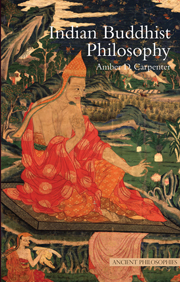Book contents
- Frontmatter
- Contents
- Preface
- Acknowledgements
- Abbreviations
- Chronology
- Development of Buddhist thought in India
- 1 The Buddha's suffering
- 2 Practice and theory of no-self
- 3 Kleśas and compassion
- 4 The second Buddha's greater vehicle
- 5 Karmic questions
- 6 Irresponsible selves, responsible non-selves
- 7 The third turning: Yogācāra
- 8 The long sixth to seventh century: epistemology as ethics
- Epilogue
- Background information
- Appendix 1 The languages of Buddhism
- Appendix 2 Intellectual context
- Appendix 3 The Abhidharma
- Appendix 4 Snapshot of Indian philosophy
- Notes
- Bibliography
- Index
Appendix 2 - Intellectual context
from Background information
- Frontmatter
- Contents
- Preface
- Acknowledgements
- Abbreviations
- Chronology
- Development of Buddhist thought in India
- 1 The Buddha's suffering
- 2 Practice and theory of no-self
- 3 Kleśas and compassion
- 4 The second Buddha's greater vehicle
- 5 Karmic questions
- 6 Irresponsible selves, responsible non-selves
- 7 The third turning: Yogācāra
- 8 The long sixth to seventh century: epistemology as ethics
- Epilogue
- Background information
- Appendix 1 The languages of Buddhism
- Appendix 2 Intellectual context
- Appendix 3 The Abhidharma
- Appendix 4 Snapshot of Indian philosophy
- Notes
- Bibliography
- Index
Summary
Writing and speaking
India of the Buddha's time, and the centuries following, was predominantly an oral culture. Script was known, but writing was not common. Instead a highly sophisticated and literary culture was transmitted orally. This included an analysis of the phonetics and grammar of Sanskrit, by the grammarian Pāṇini (probably around the sixth century BCE) unparalleled in any Indo-European language until the twentieth century. Even in the centuries following the Buddha, as writing became more widespread, practices of memorization and recitation, of debate and personal dialogue – in teaching, learning and intellectual life – remained preferred.
Texts and teaching
The Vedas are the oldest texts in India. They contain mostly hymns, myths and ritual formulae. Written in an older form of Sanskrit (now aptly called ‘Vedic Sanskrit’), by the time of Pāṇini the language of these texts was distant enough from spoken Sanskrit to require interpretation at times.
Attached to the Vedas are several related texts of three sorts, Brahmāṇas, Aranyakas and Upaniṣads. The first of these are essentially commentaries on the Vedas; the second sort, “The Wilderness Books”, also have largely to do with religious practice. In both of these, views about the nature of the universe are implicit. In the Upaniṣads, especially, we see speculative thought in earnest – reflection on the nature of human beings, the structure and origin of the universe and life, its purposes and meaning.
- Type
- Chapter
- Information
- Indian Buddhist Philosophy , pp. 244 - 245Publisher: Acumen PublishingPrint publication year: 2013

